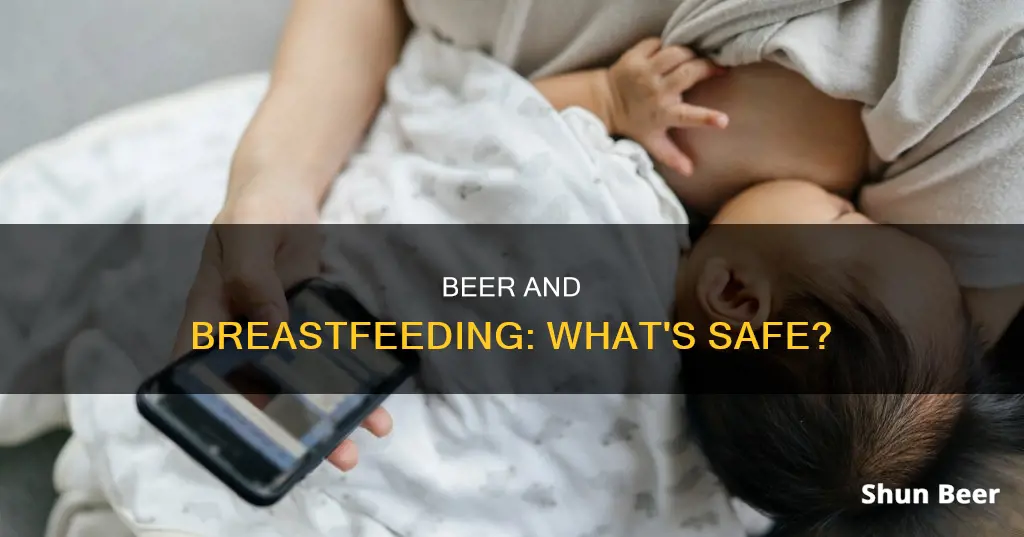
There are many opinions on whether it is okay to drink beer when breastfeeding. According to the Centers for Disease Control and Prevention (CDC), it is best not to consume any alcohol while breastfeeding. However, some sources suggest that drinking in moderation, or having one drink a day, is unlikely to be harmful to the baby. It is important to wait for a couple of hours after drinking before nursing or pumping, as alcohol will still be present in the breast milk until it leaves the bloodstream.
| Characteristics | Values |
|---|---|
| Is it okay to drink beer when breastfeeding? | It is not recommended to consume alcohol while breastfeeding. However, having one drink a day has not been found to be harmful to the baby, especially if you wait for at least two hours between drinking and nursing or pumping. |
| How long should you wait after drinking beer before breastfeeding? | It takes around two hours for the average adult to metabolize one drink. It is recommended to wait for at least two hours after drinking one standard drink before breastfeeding. |
| Can babies get drunk from breastfeeding? | Babies will consume alcohol through breast milk if nursed too soon after drinking. However, they will not get drunk but may experience negative effects if exposed to alcohol regularly through breast milk. |
| Does alcohol affect breast milk production? | Regular alcohol consumption can negatively affect breast milk supply and the let-down reflex, resulting in a reduced milk supply. |
What You'll Learn
- Drinking beer may decrease breast milk production
- Alcohol in breast milk can affect a baby's sleep
- The amount of alcohol in breast milk depends on the amount in the mother's bloodstream
- Drinking alcohol while breastfeeding may cause developmental and neurological problems in the baby
- It is recommended to wait at least two hours after drinking before breastfeeding

Drinking beer may decrease breast milk production
Drinking beer or any other alcoholic drink may decrease breast milk production. According to Dr. Valinda Riggins Nwadike, MD, MPH, OB/GYN, it is best for breastfeeding mothers to avoid alcohol altogether. The occasional drink is okay, but drinking in moderation (one standard glass of alcohol) is likely fine and will not decrease milk production. However, more than one drink may start to affect milk production.
The barley in beer can boost prolactin production, which is a hormone that aids in milk production. However, the alcohol in beer decreases milk production and inhibits the milk ejection reflex, also known as let-down, which is a hormonal reaction that allows the body to eject milk. According to research by Mennella et al., alcohol consumption by the mother decreases the amount of milk consumed by the baby. The study found that babies consumed approximately 20% less breast milk during the first four hours after alcohol consumption, despite spending a similar amount of time on the breast.
Another study by Mennella and Beauchamp showed that infants consumed about 23% less milk after their mothers drank alcohol. Additionally, the same study found that when mothers pumped milk two hours after drinking alcohol, they obtained significantly less milk. This is because alcohol significantly reduces oxytocin levels while increasing prolactin levels, and both hormones influence the milk ejection reflex. The lower the level of oxytocin, the longer the delay in milk ejection.
It is important to note that the effects of alcohol on milk production and ejection are not permanent. Milk production and ejection will return to normal once the alcohol has left the mother's system. This typically takes about two hours per drink consumed.
Non-Alcoholic Beer: A Helpful Tool to Quit Drinking?
You may want to see also

Alcohol in breast milk can affect a baby's sleep
It is important to note that the safest option for breastfeeding mothers is to abstain from drinking alcohol altogether. However, having one drink per day has not been found to be harmful to the nursing baby. Nevertheless, it is recommended to wait for at least two hours after drinking before nursing or pumping. This is because alcohol passes into the breast milk, and its level in the milk corresponds to the level in the mother's bloodstream.
How alcohol in breast milk affects the baby's sleep
Research shows that drinking alcohol, even in small to moderate amounts, can disrupt a baby's sleep patterns. This is largely due to the impaired REM sleep and increased startling/arousal that alcohol causes. Additionally, babies may take up to 20% less milk per feed in the three to four hours after alcohol is consumed, which can further impact their sleep.
Long-term effects of alcohol exposure through breast milk
While more studies are needed, some researchers have found potential long-term effects of alcohol exposure through breast milk. A 2018 study showed that 6- and 7-year-old children who had been exposed to alcohol in breast milk as babies scored lower on reasoning tests compared to their peers who had not been exposed.
Recommendations for breastfeeding mothers
To minimise the risks to the baby, it is advised to avoid breastfeeding for two to three hours per alcoholic drink consumed. If possible, it is best to plan ahead by expressing milk before drinking alcohol and then feeding the baby with the expressed milk after consuming alcohol. Additionally, drinking alcohol can affect the milk ejection reflex, so it is important to be cautious and prioritise the baby's safety.
Elvis Presley's Relationship with Beer Explored
You may want to see also

The amount of alcohol in breast milk depends on the amount in the mother's bloodstream
The amount of alcohol in breast milk is directly related to the amount in the mother's bloodstream. Alcohol is completely water- and fat-soluble, so it enters the bloodstream and human milk very easily. The amount of alcohol in human milk after consumption of one standard drink is about 95% of the amount of alcohol in the mother's bloodstream.
The highest levels of alcohol in breast milk are typically found 30 to 60 minutes after drinking (though eating food can delay this peak). It takes about two hours for the average adult to metabolize one drink, and the alcohol will have left the breast milk at this point. If you've had two drinks, wait four to five hours. If there's still alcohol in your system, there's still alcohol in your breast milk.
The more alcohol consumed, the longer it takes to clear the body. The CDC states that "alcohol from 1 drink can be detected in breast milk for about 2-3 hours, alcohol from 2 drinks can be detected for about 4-5 hours, and alcohol from 3 drinks can be detected for about 6-8 hours, and so on."
It's important to note that the effects of alcohol on a baby's system typically last longer because babies of all ages metabolize alcohol slower than adults. A newborn has an immature liver and will be most affected by any alcohol in breast milk. Up until around three months of age, infants metabolize alcohol at about half the rate of adults.
If you're drinking over a longer timeframe, you may want to pump and dump to relieve engorgement, but this milk is not safe for the baby to consume.
Beer and TB Testing: What You Need to Know
You may want to see also

Drinking alcohol while breastfeeding may cause developmental and neurological problems in the baby
While it is possible to have an occasional beer while breastfeeding, it is important to be aware of the potential risks to the baby's development and neurological health.
Firstly, it is worth noting that alcohol does pass into breast milk, and the amount of alcohol in breast milk closely parallels blood alcohol levels. This means that if a mother consumes alcohol, her breast milk will contain similar levels of alcohol. While drinking in moderation (one standard drink per day for women) may not cause immediate harm to the baby, there are potential long-term effects on the baby's development and neurological health.
Research has shown that babies exposed to alcohol in breast milk may experience increased REM sleep and decreased milk intake, which can lead to impaired immune function and delayed motor development. Additionally, a 2018 study found that children exposed to alcohol in breast milk as babies scored lower on reasoning tests at 6-7 years of age compared to their peers who were not exposed. This suggests that repeated exposure to alcohol in breast milk could have long-term effects on cognitive development.
Furthermore, alcohol consumption can negatively impact the milk ejection reflex, resulting in a decrease in milk production. This means that the baby may not be getting enough milk, which can affect their weight gain and overall growth.
To minimize the risks to the baby, it is recommended to wait for at least 2 hours after consuming one standard drink before breastfeeding. It is also important to note that the more drinks consumed, the longer it takes for the alcohol to clear from the system.
In conclusion, while an occasional beer may be safe for a breastfeeding mother, it is crucial to consider the potential risks to the baby's development and neurological health. The recommended guidelines should be followed to ensure the baby's safety and well-being.
Beer Buzz: How Many Drinks in a Full-Strength Beer?
You may want to see also

It is recommended to wait at least two hours after drinking before breastfeeding
The level of alcohol in your breast milk corresponds with the level in your blood. So, as your blood alcohol content drops, so does the alcohol content in your breast milk. The absolute amount of alcohol transferred into breast milk is generally low and is a function of the maternal level.
According to the Dietary Guidelines for Americans, one standard drink is defined as:
- 12 oz. of 5% ABV beer (about one can)
- 8 oz. of 7% ABV malt liquor (around the size of a standard drinking glass)
- 5 oz. of 12% ABV wine (one glass)
- 1.5 oz. of 40% ABV (80-proof) liquor (one shot)
It's important to note that the more you drink, the longer it takes for the alcohol to clear your system. So, if you've had two drinks, it's recommended to wait four to five hours before breastfeeding. If you've had three drinks, wait six to eight hours, and so on.
If your baby needs to be nursed before the recommended waiting period has passed, you can use previously expressed milk or formula to feed your baby. Pumping and dumping will not remove the alcohol from your breast milk or your bloodstream. However, if you are feeling engorged and need relief, you can pump and dump, but the expressed milk should be discarded as it is not safe for your baby.
Additionally, drinking alcohol can affect your milk supply and let-down reflex. Alcohol has been shown to decrease milk production and inhibit the milk ejection reflex, resulting in the baby consuming less milk. Regular alcohol consumption can also lead to a lower milk supply and a delayed let-down reflex.
In conclusion, while it is possible to safely drink beer while breastfeeding, it is important to wait at least two hours after drinking before nursing your baby. This ensures that the alcohol has left your breast milk and reduces any potential negative effects on your baby.
Beer and Teeth Whitening: What You Should Know
You may want to see also
Frequently asked questions
Drinking beer while breastfeeding is generally considered safe if done in moderation and with proper planning. It is recommended to wait for at least two hours after drinking one standard drink before breastfeeding or pumping again. However, it's important to note that the more you drink, the longer it takes for the alcohol to clear from your system.
According to the Dietary Guidelines for Americans, it is recommended to limit alcohol consumption to no more than one drink per day. One standard drink is defined as 12 oz. of 5% ABV beer (about one can), 8 oz. of 7% ABV malt liquor, 5 oz. of 12% ABV wine, or 1.5 oz. of 40% ABV liquor.
Excessive alcohol consumption can negatively impact your baby's sleep patterns, weight gain, and development. It can also affect your milk production and ejection reflex, leading to a decrease in milk intake for your baby. Additionally, there may be potential long-term effects on your baby's cognitive development and reasoning abilities.







